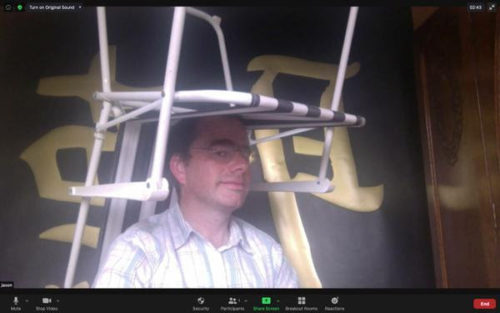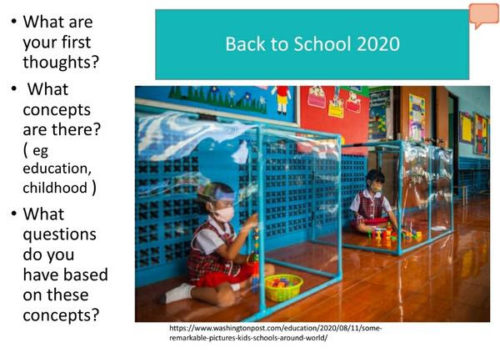This week’s theme is “purpose”:
- A lesson about purposes from Thinking Beans: A Year of Philosophy Lessons for the Classroom by David Birch, which I’m publishing. You are invited to the online book on Tuesday 6th October, 7 p.m. Click here to book a free ticket
- Insights on how to achieve the purposes of things we do in P4C using COVID-safe procedures, from last week’s open Zoom meeting.
- A list of stuff/experiences you can buy from me, which is one of the purposes of this bulletin!
Apologies to those who were trying to get into Tuesday’s Zoom and couldn’t. In some bizarre piece of autocorrecting, some messages added a digit to both the link and the meeting ID.
- Is this a hat?
As I always like to make things on Zoom as physical as possible, I’ve been using this as a warm-up question (chair tip to Pete Worley, I think?), before getting into the excellent “Purpose” lesson from David Birch’s Thinking Beans.

I’ve attached David’s brilliant sequence of stimuli and questions on this theme. My favourite, and the bit that really makes the kids smile, is the case of Mr and Mrs Washer, who raise a child (named Dish) to wash their dishes. Is Dish Washer a dish washer?
Thinking Beans is already my favourite book for philosophy for children (and with some professional jealousy I don’t except my own) and it’s not even printed yet! David will be sharing some more extracts from Thinking Beans ahead of the book launch at 7 p.m. on Tuesday 6th October. Free entry! To make registration smoother, I have made it a free “product” in the online shop – just “buy” it and you’ll get a download link with joining instructions.
- P4C Purposes with Coronavirus Constraints
In preparing for the Zoom on Tuesday, I started with a list of “what we were doing before coronavirus”. For example: sitting in a circle – generating questions – paired talk – group talk – passing a conch – moving around the classroom – lots of voices – teacher sitting in circle – letting kids think independently – using card sorts, “ometers” – blocks for talking – having time for philosophy.
The natural next step is to think, “How can we keep doing those things?” but that can lead to trying to find workarounds, which might be dangerous or perceived as such, or to focusing negatively on what has been lost rather than positively on what can be discovered.
Drilling Down to “Why?”
So instead, for each procedure, ask the coaching question, “Why is that important?” and continue to do so until you reach the thinking/philosophical/pedagogical purpose that is the deep reason for the surface procedure. Then you can think clearly about other ways of achieving the same function, but in a COVID-safe way.
Here’s an example:
What were we doing? Sitting in a circle.
Why is that important? So kids can see one another.
Why is that important? So kids can connect and respond to one another, not just to the teacher.
What’s in the way? Social distancing restrictions prevents children from forming a close-knit circle.
How can we achieve the same aim? Namechecking – requiring speakers to say, “I agree with x when they say y because z” (part of Catherine MacCall’s COPI practice)
There may be more than one solution:
What were we doing? Lively paired talk
Why is that important? Preparing thinking, more chances to articulate thoughts.
What’s in the way? Lots of voices in small space>>escalating volume>>more production of aerosols>>raised risk of transmission if virus is present
How can we achieve the same aim? A lot of the increase in volume from paired talk comes from the competition to be heard. So if the turn-taking is much more orderly, the volume need not be so loud. Ways of achieving that include one person talking for 30 seconds, then sounding a bell, then it’s the other person’s turn (also works in a group of four). Or “You said, I think” or “Facilitator, facilitatee” (below):
Send Your Suggestions
You can apply a similar process to the other processes in the list. Next week, I’d like to send out a “Reader’s Issue” where the ideas are coming from P4Cers around the world who read this bulletin. I’ve already got lots from the Zoom etc. but please send more – stimuli, COVIDising ideas, facilitation tips. Lots of the innovations forced upon us will be worth keeping, so let’s be sure to capture them.
- The Sales Bit
Our work in schools has obviously been rather in abeyance. We are now offering in-person workshops as well as Zoom workshops and training. And of courses, there’s a huge range available in our online shop:
£0.00 – A ticket to the online book launch of Thinking Beans on October 6th
£2.50 – A copy of a Philosophy Circles, Thinkers’ Games, or Pocket P4C minibook
£7.00 – A ticket for P4HE.org or giftcourses.co.uk Zoom Philosophy session for children or for adults
£9.99 – A copy of Thinkers’ Moves: Metacognition Made Simple by Roger Sutcliffe and us
£10 – A bundle of five minibooks to share with colleagues
£20 – A memory stick of philosophical storytelling, or a DVD of me working with Year 3
£25 – A block of four philosophy, debating or improv sessions from P4HE or GIFT
£40 – Sticky Questions for your class for a whole year – sets from Reception to Year 7+
£119 – An infants school set of Sticky Questions for Reception, Year 1, Year 2
£149 – A junior school set of Sticky Questions for Years 3-6
£249 – A Sticky Questions Primary Set, Reception to Year 6 (8,960 stickers!)
£249 – A Primary Curriculum Pack with over 160 session plans, Spot and Stripe videos and more
All of the above, you can find at www.thephilosophyman.com/shop Prices plus P&P and VAT unless it’s a book. Or if you’d like to include a virtual visit from me, you can add an hour of Zoom INSET or a Zoom workshop for up to six classes for just £200 to one of the last two items in the list! Hit reply to arrange a conversation.
Best wishes,
Jason
PS I’ll leave the last word to Susan Andrews who shared this with us in the Zoom. I think it shows how, going back to last week’s bulletin, “Do it”, “Do it outside” are the most important bits of advice:
I had 3 classes with teens today and I did 20 minutes inside, 40 mins outside for each group. Otherwise it’s so tricky with masks and confinement at desks. I was worrying for weeks about how I would get them going but to be honest they were all up for it. These are groups I have been teaching for 2 – 3 years ages 13-15. So, there was a thirst. I had worried whether they would engage at all as last time we were at school was March the 12th or they might have forgotten how to do philosophy.
The stimulus was the pic below but the questions they came up with and voted on were on the concept of justice. Lots of lively chats about different categories of murders and punishment and torture and rehabilitation, forgiveness and love etc. Nobody wanted to talk about covid.
